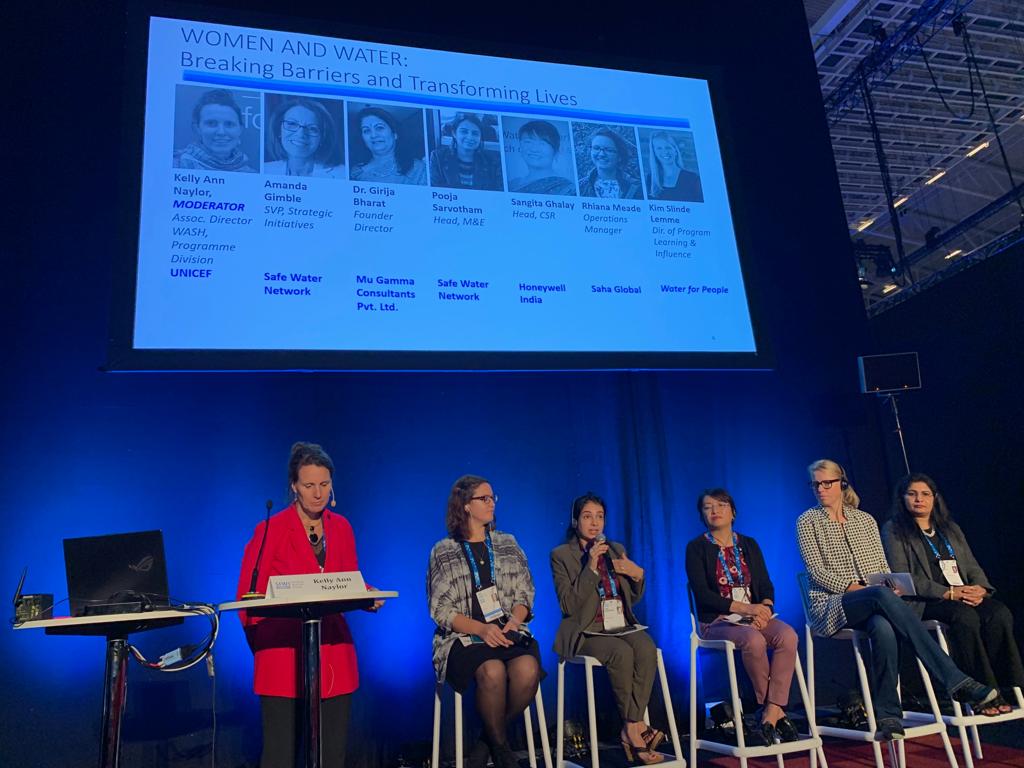 Stockholm/New Delhi, September 2, 2019: Rural women in India are increasingly overcoming traditional barriers and are participating in water provisioning through social enterprises. This fact has been revealed in a report Small Water Enterprises: Transforming Women from Water Carriers to Water Entrepreneurs 2019 released at World Water Week organised by the Stockholm International Water Institute (SIWI) in Stockholm. The report has been prepared by Safe Water Network India, a NGO, with grant support from Honeywell Hometown Solutions India Foundation (HHSIF) and working with USAID. The Report details how Safe Water Network has helped mainstream women switch to entrepreneurial and operational roles to own and manage small water enterprises (SWEs). SWEs are locally owned and operated water treatment plants that expand access to safe, affordable water for communities of 3,000-5,000 people.
Stockholm/New Delhi, September 2, 2019: Rural women in India are increasingly overcoming traditional barriers and are participating in water provisioning through social enterprises. This fact has been revealed in a report Small Water Enterprises: Transforming Women from Water Carriers to Water Entrepreneurs 2019 released at World Water Week organised by the Stockholm International Water Institute (SIWI) in Stockholm. The report has been prepared by Safe Water Network India, a NGO, with grant support from Honeywell Hometown Solutions India Foundation (HHSIF) and working with USAID. The Report details how Safe Water Network has helped mainstream women switch to entrepreneurial and operational roles to own and manage small water enterprises (SWEs). SWEs are locally owned and operated water treatment plants that expand access to safe, affordable water for communities of 3,000-5,000 people.
Women are grossly underrepresented in the Indian economy, says the report. They comprise only 26 percent of the total workforce and contribute merely 17 percent of India’s GDP as compared to the global average of 37 percent. Further, rural women are responsible for collecting 80 percent of the water consumed by households that do not have access to safe drinking water on their premises.
The Report highlights the success of Safe Water Network India’s iJal Women’s Empowerment Program that was piloted in Medak district in Telangana with strong participation from lawmakers, district administration and local government. The Project has empowered over 170 women entrepreneurs and provided 150,000 people with affordable access to safe drinking water. With the support of Honeywell, the programme will eventually provide safe water access to over 540,000 people in Telangana and Maharashtra.
Ramona El Hamzaoui Deputy Mission Director of USAID, said, “World over, we have seen that it is women who have the responsibility of ensuring that their family has a ready supply of clean and safe drinking water, for which they have to walk for miles on a daily basis. Hence, it was imperative that an initiative like Safe Water Network’s iJal should be taken forward to empower women to become water entrepreneurs rather than water carriers. The Report has showcased the successful journey of many women. The water kiosk model has buy-in from the community, the private sector and the Government of India, paving the way for replication.”
An official from North Delhi Municipal Corporation, said, “Affordable water kiosks like 24×7 water ATMs provide affordable and safe drinking water security and prevent plastic scourge as consumer collect water in their own bottles. It is heartening to see women break through the glass ceiling, and become entrepreneurs and livelihood generators.”
Mike Bennett, President, Honeywell Hometown Solutions, said, “Honeywell is committed to creating lasting solutions for sustainability challenges facing communities around the globe. The Honeywell-Safe Water Network Initiative is helping tackle one of the most critical challenges in the communities we serve – the need for clean, safe drinking water. This initiative is also helping change centuries-old traditional behaviour by enabling women to participate in the household decision-making process.”
Poonam Sewak, V.P. Programs and Partnerships Safe Water Network India, said, “This programme enables women overcoming traditional barriers and acquiring skills for managing small water enterprises and bridges the gender gap through economic empowerment and reduction of water collection drudgery for the women and girl child. We are thankful to Honeywell for their grant to develop a women-centric water entrepreneurship model.”

